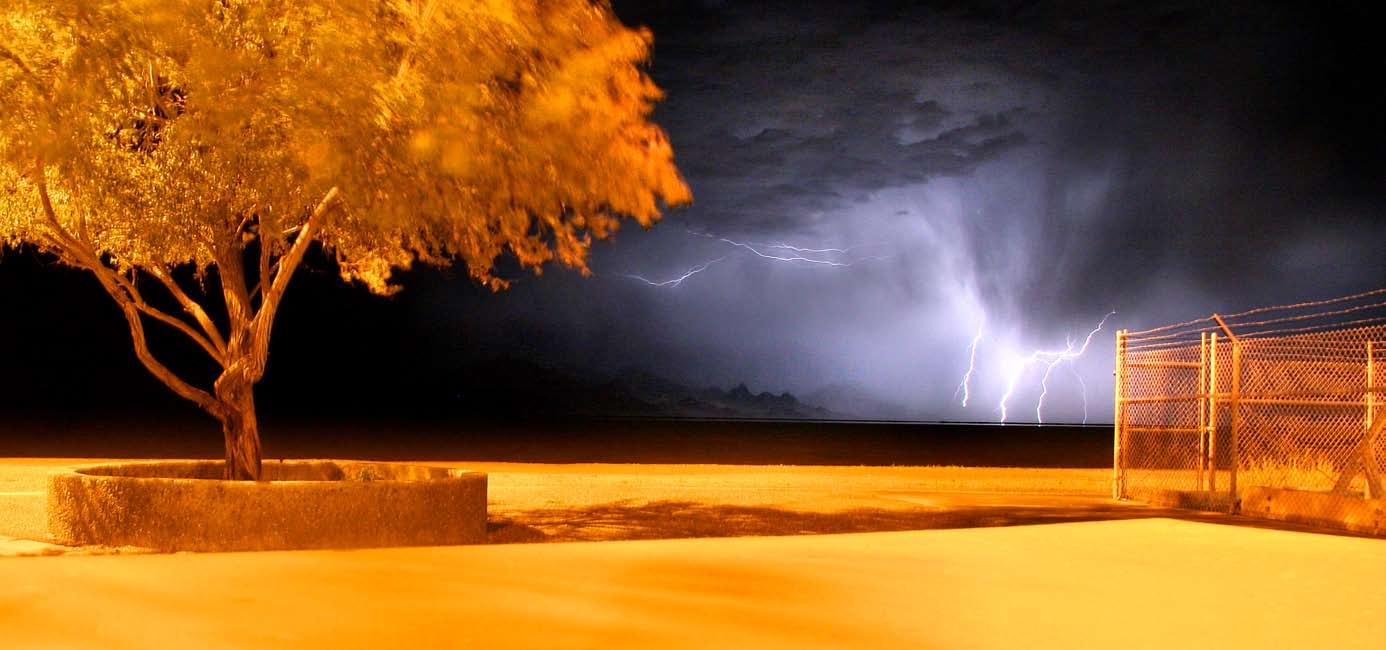

Folio: Nightlife Spring 2006
olio: Nightlife Spring 2006
Table of Contents Art Ashlee – Kelli Smith 6 Lovers – Barbara Lockwood 9 Tower – Adam Heath 10 Fullmoon – Larry Mondragon 13 Trumpets – Randy Despain 16 Imagination – Heather Miller 19 Torn – Jeremy Allan 20 Fly Hook – Jeremy Allan 26 Razors – Jeremy Allan 28 Suicide Contrast – Dominic Mattena 29 Venice – Dominic Mattena 31 Crane – Tawny Kai 34 Serenity – Catherine Wood 38 Florida Jaguar – Renee Johnson 41 Pinhole Camera Cupcake – Tawny Kai 45 Spider Retouch – Jeremy Allan 48 Jessi – Barbara Lockwood 54 Wheel – Chris Swainston 56 Untitled – Adam Heath 57 Falling Stone – Adam Heath 59 Sunflower – Adam Heath 61 The Other Ones – Kyle Corbin Jones 65 Praying Mantis – Jeremy Allan 70 Memories – Randy Despain 73 SLC – Dominic Mattena 74
Salt
EssAys Why I “Choose” to be Gay – Ryan Hollist 22 War: Not a Necessary Evil – Stacie Lawrence 62 short story Radiance – Clint Johnson 12 Retrospection – Chad Coleman 32 Stanley’s Grandmother – Ryan Cottrell 42 War Letter – Shelley Johnson 58 PoEtry Broken Pictures – Camille Heffield 6 Daytime Hours – Stephanie Gallacher 8 Mausoleum of Mao Tse-tung – Chris Valentine 11 Hasta la Fuego – Stephanie Gallacher 17 Innocent Simplicity – Laura Michie 18 Where I’m From – Dominic Simpson 21 Photographs – Tamarra Evans 27 Lost Cause – Cassie Jones 29 Untitled – Robbyn Curtis Mortensen 30 Admiring Adam – Ryan Hollist 38 Untitled – Robbyn Curtis Mortensen 39 Wasatch – Chad Coleman 40 Diluting Memories – Stephanie Gallacher 52 Touch – Tamarra Evans 53 She – Chad Coleman 55 Untitled – Robbyn Curtis Mortensen 72 Winter Trees – Ryan Hollist 74
Literary Magazine
Folio A
Lake Community College
VIII Number 1
2006
Volume
Spring

Broken Pictures
I found myself today in a broken picture and I wanted you to know that I think that I’m alright. I’m still looking for the rest of me
but once I find it all I’ll give it all to You since You seem to want me. I’m turning over all of my tattered self even if I have to pry it out of my tightly clenched fingers. After I find myself glue me back together and paint me over to make me what I was supposed to be. I love You for putting me together again and I missed You while I was ripping myself to shreds. So fix me remake me and hang me on Your wall of unfinished masterpieces.
—Camille Heffield
� �
Ashlee —Kelli Smith
Daytime Hours
Lightless flow into dappled captivity; ferns & bluebells droop from Earth. I see dragon shadows among stars, as fire ceases to enflame the heart.
Horizons to Venus’ surface creep with the caress of feathered hands; may you settle in dream-filled sleep. What happens when the poet dies?
Give up your disembodied embrace. We shouldn’t try this thing, love.
—Stephanie Gallacher

� �
Lovers
—Barbara
Lockwood

Mausoleum of Mao Tse-tung
an effigy of power to the People— on display—in his glass grave— like his botox smile collapses, so bridges the Yangste. a damned Chang Jiang drowns— model applicants of qin’s Mercury army— embedded—in ages, beats or breaths, Our ancestors become Mermen—probably. or maybe— a moment from now— when We’re addressing Our condition— We find Atlantis’ tools in the river and conclude Our origin as dolphins. in this concrete wonder— of Power to the people— two corpses to a coffin— who would embed with god?
—Chris Valentine
10 11
—Adam Heath
Tower
Radiance
There is the dark. There is me.
We are not the same.
It is all a lie; the way I feel it on my skin, the way it whispers when I speak, the way we listen, deafened by the silence. It is other than I am, apart and different. I will not die when it retreats; I will not drown in the light.
Sound from that other world, heavy scuffling from the realm above. Footsteps echo, making the black ripple. The world-shaking bump of the opening lock then... Burning!
Agony! Scorching breath in molten lungs! And screams. My screams.
The voice is above, the maker of pain, a demon breathing fire upon me from angel’s heaven.
“I promised, didn’t I?” The voice is above, the maker of pain, a demon breathing fire upon me from angel’s heaven. “A year. Twelve months and still alive. That never happens. Such a rare day. A special day! And because of that I’ve brought you a present.”
A piece of fiery hell enters my world.
“Enjoy! You only have it for an hour. And when next year comes you will no longer care. No one ever has.”
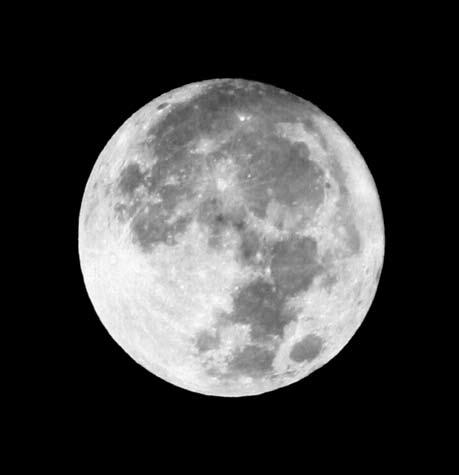
12 13
Fullmoon —Larry Mondragon
The sky caves in; all is stone. Devil’s footsteps melt away, absorbed by the gnawing dark. But still hell’s ember burns the heart of my black world—my heart.
One hour, it had said. I only must endure one hour. It is more than a word; it is a time, a limit with meaning and form outside the black place. The demon will return; will take back its flame. I only must wait for the pain to end, to be cradled by the void once more.
. . . the black, crept back to the ends of the world where it pulses, eager to merge once more.
To feel nothing. Or….
There is the agony. There is the fear. But is there me?
I force open my eyes; refuse the needles that prick them. They bleed; I feel it on my cheek. But still they see. Paleness, softness, in static form and steady motion. It shakes, wavering like the hot from the ember. But it is there. I am there! And the darkness, the black, crept back to the ends of the world where it pulses, eager to merge once more.
But it is there and I am here!
I force myself to accept the ember, to perceive the flame. The agony consumes, lighting me bright as the spark. I welcome it and, as I do, the pain lessens. The perverse brightness dims till it scourers my tingling, wonderful self. Warmth! A flush of other life on my skin. It
forces memory, opens locked doors inside to show a world of light. It is called a sun, and the ember has become my own sun. It is my new god. I see it now, passed the painful bright; see the giver of the light. It moves, cavorting in the air, alive as I am. Beneath its body, pale like my own, shifting, dripping. It is other than the dark, as I am; yet it has the power to defy as well. I love the ember. I worship it.
Sounds above; that other realm. The demon has come again. My new world wavers as the sky opens wide. Painful radiance tries to drown my sun.
“No!” The sound is old, too old to remember; but it speaks my will. “No take it!”
“So, you liked that, did you? I’m glad. It’s the last time you’ll see it - see anything.”
“Bye, bye! Goodbye, little flame! Time to meet the dark again!”
The ember rises; my sun starts to leave.
“No!”
“Bye, bye! Goodbye, little flame! Time to meet the dark again!” I try to follow my sun, but it moves as I cannot. It goes to that awful place above, to the heaven/hell. But before it leaves I take my pale self and touch my sun, merge with it. A piece of the ember settles in me, burning. Delicious.
The sky laughs and caves in once more. My sun smothers; light
14 15
dies. The dark comes to claim me again with still rejoicing.
It cannot have me. My splinter of sun is with me. I feel it searing in the pale thing that is no more. It is other than the dark, even in the dark. It gives me joy and I make the joyous sound, hoping the demon hears in his other realm. This time, the void does not echo.
I float on the dark, cradling my shard, and sing the silence to myself.
There is the dark. There is me.
We are not the same.
—Clint Johnson
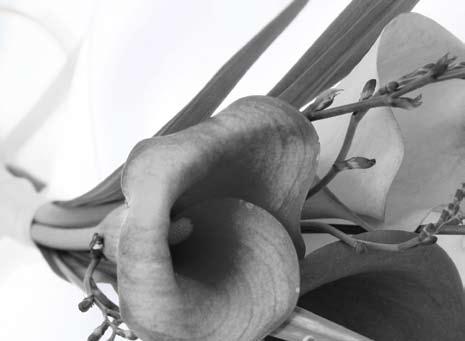
Hasta la Fuego
As the music stops mid-meter, a jape crawls through the split of second hands and I wonder if I have naught to learn.
As all but up is going like candles burning spin freedom between bedsheets since I’m going to fall for long.
As eyes dissolving in October building laughter’s compromise do we have much more than clothes?
This poem is an abstract lie.
As breathing is dissonance is nothing you consider warm? Crawling up the silence still to the crackle of our past.
To him I whisper, “until the fire,” and spill the milk at last.
—Stephanie Gallacher
1� 1�
—Randy Depain
Trumpets
Innocent Simplicity
The wonder such in a child’s gaze, fresh learning within a sphere, still unaltered of many things to touch, build, conquer, and find in innocent simplicity of life’s bounty. Then children grow, losing innocence for wisdom’s pathway preparation of future day life’s success. Yet virtue’s light in every child remains bright— so rises each in heights unmeasured. And so age brings life experiences—
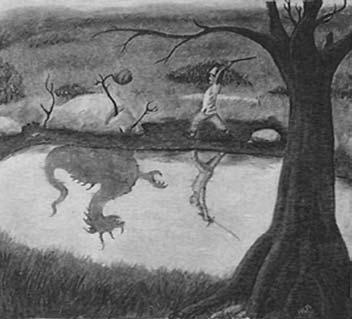
then returns to share, which blesses all the young. But shouldn’t we learn from those so tender— joy in life’s simple pleasure?
Re-discover!
—Laura Michie
1� 1�
Imagination —Heather Miller

Where I’m From
I come from a tormented background
I come from a peaceful and loving family
My Dad’s seen a lot and has been through hell
My Mom’s family was ideal and cultured
My Father’s side is tattered and worn history with jagged edges that rip and tear through the heart of the family
My Mom’s side had problems but they were ignored, she still ignores them
I’ve been through hell and know how to deal
I’ve been punched, pushed, kicked, scraped and impaled
I come from broken homes, broken glass and broken hearts
I come from a home built on eggshells
I come from a house of love
I come at the world with an attitude of “I’m still standing,” “down but not out,” “lost battles and won wars”
I don’t know what I am yet, but know where I come from
—Dominic Simpson
20 21
Torn —Jeremy Allan
Why I “Choose” to be Gay
“You talk about coming out like your preachers talk of being born again.”
—Frank Browning, “American Religion, Gay Identity”
“Why did you choose to be gay?” My mind reeled from the question. In nearly seven years of being out, I had never heard that question seriously asked—let alone directed at me. To be fair, I was standing in the LDS Institute of Religion at the time. If there was anywhere to find someone who would sincerely ask that question, it was there.
I quickly tried to recover from the surprise. I tried my best to explain the difference between having innate attractions and the choice to be out and honest about them.
Looking back, however, I realize it was a much more legitimate question than I first realized. I do not mean that I chose my attractions, but why do I choose to be “gay?” Why do I openly identify myself as a gay man? Most importantly, why do I do this when it causes me to be at odds with the policies of the church I believe in and therefore out of reach of most blessings of its membership?
For five years after coming out I oscillated between the seedy cliché of the “gay lifestyle” and the obedient “repentance” of orthodox
Mormonism. I eventually crashed and fell into a depth of despair I never thought existed. There was no more energy in me to try reshaping myself into what a culture or religion said I should be.
To whittle away my pointless existence, I read. First, it was fictional amusements. I found what pleasure I could from the adventures of young wizards and outcast warriors. Once those were exhausted, I grabbed whatever remained that was yet unopened from my shelf.
I first read Positive Solitude by Dr. Rae André. She wrote about the strange concept of finding happiness alone. Was such a thing possible? Did I really have the ability to find satisfaction in life without relying on others?
Did I really have the ability to find satisfaction in life without relying on others?
Could an idea not endorsed by society really work? I felt intrigued by the idea of finding a source of completion in my life through a sense of personal and internal completion.
Next, I read about love in coming out. At first, I expected little from Dr. Rob Eichberg’s Coming Out: An Act of Love. I was thinking it would be more about finding love from those one comes out to. However, I became interested in the ideas of coming out internally. I decided to participate in the author’s questionnaire about concepts of feeling and accepting love. I wrote down each answer, not bothering to
22 23
edit or censor. Each response was predictable, understandable, already addressed . . . except one. I was shocked. Was this what I really thought about myself? It was as if a bolt of lightning hit me in that moment. I saw a secret in my thoughts that disgusted me. I had absorbed so much media hype about what it was to be acceptable. Something had to change.
Then I devoured a collection of essays called Gay Men at the Millenium. I saw so many different angles—so many ideas I’d never thought before. Many that I did know, but from viewspoints that made them completely new. I felt physically ill as I read about a man with AIDS, who thought he was doing a favor to those he had anonymous and unprotected sex with. I rethought my beliefs about the idea of having an open relationship. I reconsidered the cliché of the “gay lifestyle” I had so fully bought into. I realized there were variations and degrees in being gay; being human. More importantly, I considered, for the first time, that being out was not just a political issue. Being out was a personal spiritual journey, between God and me. I realized I needed to explore my possibilities.
I decided it would be best to start with looking at some old ideas in new ways.
I looked up old contacts to begin again. I decided it would be best to start with looking at some old ideas in new ways. I began to attend church meetings again as well as gay affirmative organizations
for gay Latter-day Saints. I approached my search with a very different understanding than I had those years before. There was no “either/or,” no “purely gay” or “strictly LDS.” There were as many permutations of possibilities as there are people. I no longer viewed each idea as a whole, either to completely accept or completely reject. Ideas were filtered, concepts broken down, and principles compared to what I knew and felt for myself.
After a time I realized one aspect that I had avoided. Was it possible that my Heavenly Father could, even does, accept my sexuality? I had assumed the answer was “no.” That was all I ever heard. But wasn’t this another idea to filter, break down, and compare? Even as a child in my LDS Sunday School classes I learned not to assume answers, but to seek spiritual confirmations. It was time to do something with all the information I had gathered.
I knelt in prayer that day. It was not easy, but I had to know. For so long I ruined my life based on assumptions—based on what others told me to think. I took everything I had that day—my knowledge, my beliefs, my sexuality, everything—and surrendered. I offered it all up and assumed nothing from the Lord. I did not ask the Lord to take anything away. I did not ask for anything in return. All I asked was to understand His will so that I could do it.
Most people refuse to believe, or just cannot, the response I received from my supplication to the Lord. Even I was surprised at first. It was as if the Lord came to me, took my offering, and gave it all back to me. As I knelt there beside my bed—the sheets drenched
24 25
with my tears, by body completely exhausted—I knew emotionally and spiritually what I should do regarding my sexuality, “Embrace it, know it, and have joy.”
—Ryan Hollist
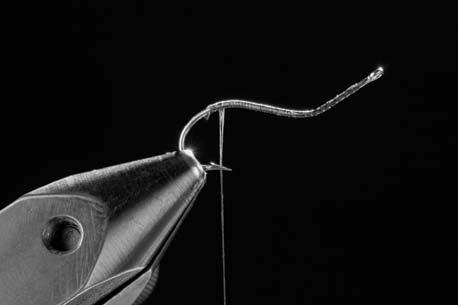
Photographs
Capture me, capturing you in a falsely perfect altered view.
Capture me as I capture you with enhanced features and engaging brilliant blue. Capture me. You’ve got me high off pink accents and black n’ white. Capture me. I’m swept away by depictions that are ultimately fake. Now capture me once more, but with the real you— in your wonderful humanness in your eyes of brilliant blue. In your supposed draw-backs, in your so-called flaws, in the perfect being that needs no alterations at all.
—Tamarra Evans
2� 2�
Fly Hook —Jeremy Allan

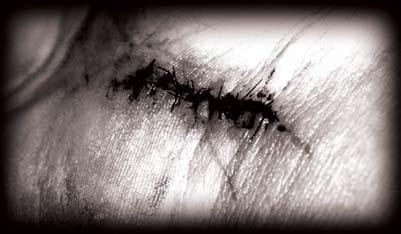
Lost Cause
Part I 1 - the search for the missing sock
2 - understanding my personal finance class
3 - finding gloves that fit
4 - forgive and forget
5 - true love
6 - you
Part II 1 - escaping my past 2 - living my dreams
3 - accepting my future
—Cassie Jones
2� 2�
Razors —Jeremy Allan
Suicide Contrast
—Dominic
Mattena
Untitled
kiss the sovereign lips and wander the wetted streets ravenously reaching for unforgiven fingertips ones that stroke, so perfectly the ivory yoke and point out your soul into a life abounding gray for all to squeeze, push and lay, with the streets and your extravagant eyes seeping the truest of all brown into the crooning night where the pale moon cries
—Robbyn Curtis Mortensen

30 31
Venice —Dominic
Mattena
Retrospection
I’m still wet from the shower, but the basement is warm. I put on my clothes and they stick to my skin. The basement is safe. My refuge is faded orange shag-carpet and wood panels, older than me. It smells of billiard chalk. I push the brightly colored globes out of my way. I lie down on green velvet; breathe it in. The powdery musk and the yellow glow of the lamp lull me into a reminiscent daze.
I’m watching a slide show. Pictures flicker, dark to bright to dark, telling me about a night, reminding me of a story. A fast food joint and a young boy in a brightly colored monkey suit. An aquamarine Ford Escort with a girl inside, crying out in horror-pain because she failed a test. The smell of Coke and nacho cheese overpowers me, sickens me, and the fryer sizzles laughter after the boy as he runs out to console the wailing customer.
I start, giving a slight twitch when Grandma calls from upstairs. She whispers something to Grandpa, then turns to me. It’s the phone, and it’s for me. But nobody is supposed to know I’m here except Mom and Dad, an hour away. And Chelle. It’s her; I know she’s tired because when she speaks she does it very carefully.
Dad comes in his gray truck. I see his glasses echoing the street lamp. The crickets are singing off-key tonight. I wish they’d shut up. The air in the front yard scratches at my neck and I realize too late that I should have put on my jacket.
We drive for a long time in the dark. Dad talks some but doesn’t really say much. He tells me that I shouldn’t be afraid, but his eyes are saucers and his knuckles are bloodless; white on the steering wheel. I try to watch the lights whipping by in the windshield, diamonds toward and rubies away, but someone has tied a string to my forehead and my eyelids. I can’t keep them from pulling downward. After a while I stop fighting it. I see a little girl with flowers in her dark brown hair and Joe Cocker tries not to sing out of key while mosquitoes gossip loudly in my ears. The child takes me by the hand, leading me away from Woodstock and bothersome insects to I-don’tknow-where. We walk for hours underneath a sun so hot that it must be newer than the old one that I’m used to. It reddens my face and even penetrates my shirt, burning through to my guts, a boiling stew of blood and ash. Through all of this the child remains unchanged. She skips like springtime, dragging me along behind until we reach our destination. An oasis. A lake, so deep and green that it could have been a pool of liquid jade. The brown-haired little girl leans over the edge between earth and water and motions me to do the same. Still gasping from the journey, my
The fat woman smiles at me and puts a plastic band on my arm that scolds up at me with a single word, “Scott.”
32 33
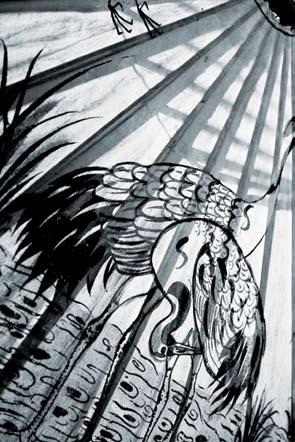
only wish is to drink up the lake, to swallow it all. But coming closer I feel something more urgent than thirst. I have a sudden and undeniable urge to see what the child is looking at. Standing next to her I peer down, expecting to find an answer to something, anything, only to find my mirrored visage beside hers in the water. Disappointed I bend to take a drink when I realize the mosquitoes have caught up to us, this time in an enormous drove. Swatting wildly, I lose sight of the girl.
All I see is swirling black and soon the
world around me becomes a violent haze of noise.
I’m awake and blanketed in buzzing fluorescence. I’m here. An unseen barrier stands between the doorway and me but I walk in anyway; everything is humming.
On the third floor everything is white, white, white. The fat woman smiles at me and puts a plastic band on my arm that scolds up at me with a single word, “Scott.” I tell her that’s not my name but she just chuckles and says “I know that.” I don’t like her. She’s sweaty and her lipstick is too red for her to smile that much. But I follow her anyway because she’s bringing me to see Chelle. The fat woman stops outside one of the doors in the blazing hallway; it’s too bright in here. Opening the door she smiles again and this time I can see that she’s got some of the red slime on her teeth. She turns and walks; I don’t smile until she’s out of my sight.
I see her smile in return beneath the veil.
Inside the tiny room Chelle wears the same face that I had pictured on the phone. I was right. When she sees me her mouth pinches up at one of the corners and one eyebrow raises. She does this because it makes my insides get mushy and she knows it, so I go to her. As I come closer she looks a little older than the last time I saw her. I can’t help but feel like a child. I sit beside her bed for long time. Neither of us knows what to say, so we don’t say anything.
34 35
Crane —Tawny Kai
The fat woman is back and she makes me leave, wants me to sit on the couch outside Chelle’s room. She smiles again as she takes Chelle away and I fall into sleep on the cramped couch.
Beneath the pounding sun again I walk, this time by myself. I try to find a path back to the place I was before, but sand and sun extend to the sky in every direction. Just as I am about to collapse, a woman, veiled and draped in a blue robe, catches me by the arm and hoists me to my feet. The stranger begins to walk, so, with no other choice, I follow. Briskly she trots on ahead of me, so briskly, in fact, that it is hard to keep up. But I manage and, stranger though she is, I feel that she knows where I need to go. Finally, we reach the pool and I gasp a sigh of thanks. I see her smile in return beneath the veil.
I see myself . . . reflected with Chelle . . . our reflections coalece into a single image.
“Don’t I know you?” I ask the stranger.
“Yes,” she says and motions to the lake, signaling the end of my inquiry. I step to the edge of the water once more and look in. I see myself, this time reflected with Chelle smiling up at me, our reflections coalesce into a single image. The stranger puts her hand on my shoulder and smiles once more.
“It’s time” she says, and when she speaks she does it very carefully.
Chelle looks peaceful, though exhausted, lying in her bed; an orange lamp burns warm in the corner. Underneath the lamp, soaking up its heat, something white-pink squirms and makes a gurgling noise. It wriggles and I see that, just above its clenched fist, it wears a band that looks like mine. This time the bands whisper reassuringly together, “Scott.”
Ribbons of sunlight filter through the shades illuminating the bundle in my arms, painting my body with horizontal brilliance. Rocking back and forth in the chair, I look at the eyes staring up at me and wonder if this is how God feels.
—Chad Coleman
3� 3�
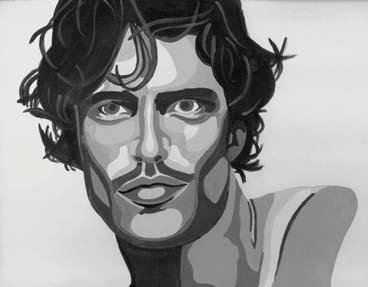
Admiring Adam
Above the door lies
Adam and his apple.
To step out of the room
I must pass under his agony. I think, is it truly necessary for such pain?
Adam rejoiced in joy after Death’s creation. Can I still rejoice after the death of Us—
Adam’s creator standing next to me?
We admire agony.
—Ryan Hollist
Untitled
As a wild (flow)er permeating in breezes redolent sanctuaries evince, sluingly (kind) Liberties; ether floating . .
Liefy torrents of structure contemplate to sustain grandeur; God looks upon petals (belief) thought: is like clouds that mystify the moon
—Robbyn Curtis Mortensen
3� 3�
. . . .
Life
Serenity —Catherine Wood
Wasatch
The weathered peaks cast their gaze upon the foothills, old men tending to children.
—Chad Coleman
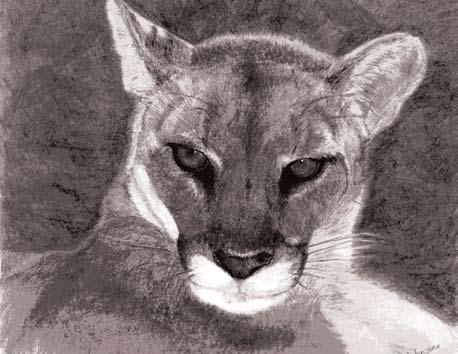
40 41
Florica Jaguar
—Renee Johnson
Stanley’s Grandmother
“So, I know what your problem is, Stanley,” my grandmother clucked. She wore a quizzical, almost comical look as she struggled to contemplate my “problem.”
These Grandmother “Eureka!” moments have never gone smoothly. Grandmas have this innate ability, inherited through some sort of genetic fuck-up, to solve all of your problems. It’s bad enough you have your Mom hounding you to go see a psychologist, but now your grandma believes she’s Dr. Phil’s backup. Magically, in a flash of brilliant thinking, grandmothers know how to solve all your ills. Deep within their withered craniums, they unravel all of your problems with one or two lines about your insecure puppy holding you down and stupid shit like that. “You’re like a barn without a horse! You need some horses in your barn, and a little pig to get you back on track!” “Oh thank you, Dr. Fatass! You’ve solved my addictions to cocaine and PCP! Thank God for you!”
People flock to this douche-bag mentality. I simply don’t get it.
Whoa. Went off on a tangent there. Where was I?
Oh right…Grandma.
Don’t get me wrong. I love my Grandma. She’s given me food and money, and once in a while she’ll bake me and the other grandkids cookies. And the fart-bag of a husband she married after my Grandpa passed away can be nice when he so chooses to be.
The last time she knew my problem (I broke up with my girlfriend)
she said only church could save me. I had been drinking wine at the time—my family drinks a lot of wine—and responded with a sarcastic response . . . something along the lines of “I don’t think God would have sex with me, but if He’s up for it, I’m game. Who knows? I might even
. . . old people say stupid stuff. I believe it has to do with the brain.
enjoy the turncoat moment of sleeping with a dude.”
I had to write an apologetic letter and swear my religious affiliation before she talked to me again after that one.
So yeah, old people say stupid stuff. I believe it has to do with the brain. When you’re young it picks up things along the way, much like wine. You throw in some grapes, some seasonings, old tires and boots, whatever tickles your fancy. When you’re at the peak of your brain capacity, like a good glass of wine, you are flavorful and full of pep.
Then there’s your brain when you’re old. I compare it to a bottle of wine that was left open, and now tastes nothing like wine at all. It’s piss and vinegar. You would never drink it, unless you were so drunk you didn’t know the difference between piss and wine (I’ll give you a hint; the piss tastes bad . . . not that I’d know.)
It happens to all of us. Just look at President Reagan.
42 43
“Red potatoes are the best!” “No, Yellow”
“Obviously Russets!”
“You Russet Whore!”
I think the awful timing of my grandmother’s great proclamations bothers me the most. These usually happen during family reunions, at dinnertime or during the evening talent shows our family has. Imagine a useless talent show showing off how “little Jimmy now takes a shit in the toilet!” and “cute little Jessica can play the violin!” What Jessica’s parents don’t tell you is their daughters “playing” sounds worse than Carrot Top being beaten to death with his own dumb props by all the angry comedians in the world. Consider these elements and you begin to see why my family drinks a lot of wine.
It was just one of these get-togethers when my grandmother’s frilly purple hair caught onto some mystical static and “eureka!” a plate of bullshit appeared from thin air!
It was summer. We were at my grandmother’s cabin in Idaho. The evening sun shot through patchy areas of forest, blinding young children and letting old people see clearly again for the first time in decades. Mosquitoes swarmed around me like angry beavers that see trees across a canyon, but can’t quite reach them, thanks to the power of Deet.
My mother was inside the cabin, discussing the best potato

44 45
Pinhole Camera
Cupcake —Tawny Kai
casserole recipes with her two sisters. “Red potatoes are the best!” “No, Yellow!” “Obviously Russets!” You Russet Whore!” (Okay, I admit, the Russet Whore comment never escaped anyone’s lips. I know they were thinking it though.)
My ass cheeks were starting to secede from my body, having been forced to submit to those awful waffle-ass folding chairs. My grandmother sat across from me on the deck at a picnic table with the classic checkerboard red and white tablecloth, with an empty bottle of Ravenwood Zinfandel 2002, and another already half-empty. My niece Veronica was with all of the other young children in the backyard, trying to knock the shit out of the Pikachu Piñata with an official MLB wooden baseball bat. Poor uncle Bob was trying to keep all of the children in line while little Veronica swirled around in her white dress, her blonde hair matted against her face, the bat flailing about in mysterious directions, narrowly missing poor Bob’s crotch a couple of times.
I sighed and waited for the debacle to happen. Surely Bob’s groin was getting a bat shot soon. It was clearly inevitable.
And it was there, from the corner of my eye, I saw my grandmother looking at me through the gigantic Trent Lott fashion glasses. Her bluishgreen eyes tried to stare into my soul and suck out whatever evil I had planted within myself, like a Dyson vacuum. I picked up my glass of wine and took a long chug. I knew what was coming.
And it was there, in the corner of my eye, my grandmother looking at me through the gigantic Trent Lott fashion glasses.
In the background, little children screamed for their turn to narrowly miss swinging a bat at Bob’s vulnerable package.
“So, I know what your problem is, Stanley,” my grandmother clucked.
Wow. I didn’t know I was excreting problems onto my grandmother again. Apparently I must do this to her quite a bit.
“I’m fine, Grandma,” I blurted, perhaps a bit rudely. “I’m just tired. This is the first couple of days I have had off from work in months.” I downed the rest of the wine in my glass and poured another.
“No, that’s not it,” Grandma replied. One hand began to tap her wine glass with her fake nails; the other kept clasped to her purplish, matted hair—rubbing and pushing it into her scalp. It appeared she was trying to keep her cerebellum from escaping. I couldn’t help but chuckle.
In the background, poor Uncle Bob was evading another groin shot. “For God’s Sake Jimmy,” he screamed for his groin’s life. “Swing the bat higher!”
“Are you dating anyone?” Grandma inquired. “I bet that’s your
4� 4�
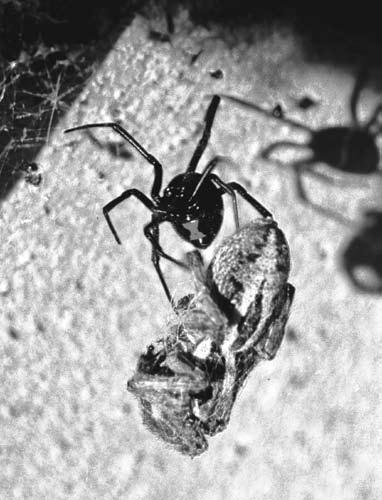
problem.”
“No Grandma. I’m not dating anyone and, no, that’s not my problem.” Another quaff of wine.
“Are you still going to church?”
“We’ve had this discussion before, Grandma. I don’t want to get into it right now.” I poured her some more wine. “Just enjoy the evening.” Grandma gave me a concerned look, and kept looking at me with great urgency. In the background, Uncle Bob yelped again in frustration.
It was as if she were playing Clue with my faults . . .
“Sweet merciful crap, Judy! What did I tell Jimmy? Swing the bat higher! And don’t move around so much!”
Uncle Bob could have solved all of his problems if he would have gone to the shed and retrieved a smaller bat. The kids were unable to swing higher, and were unbalanced because of the weight of the bat. But Uncle Bob was a dumbass, so I said nothing to him. Clearly, karma had chosen his retarded groin to be whacked, Louisville Slugger style.
“You aren’t gay, are you?” Grandma asked almost desperately. Her hand had stopped trying to keep her brain in her skull and was now tapping the wine glass with its twin. By this time, I was very buzzed, and becoming annoyed by the
4� 4�
Spider Retouch —Jeremy Allan
conversation. It was as if she were playing Clue with my faults, trying to guess which one had killed my inner happiness. It was a lack of a love life, with a candlestick, in the dining room!
“What is it about me that bothers you so much,” I angrily replied. “You have never fully understood me, you have never tried to understand me, and your damn questions aren’t helping the situation any! So please, before I really get upset, stop with the inane questions!” Another sip of wine. My glass was empty. Already drunk, I poured some more and took another huge gulp.
A short distance away, a baseball bat had met Dumbass’ sack with startling efficiency. A sucking gasp escaped his lips as he fell to the ground and rolled into the fetal position.
“No, Stanley,” Grandma defensively retorted. “There is a problem with you, and I know what it is.” A small smile of satisfaction started to spread across her face, making her look like a Jack-O-Lantern at Halloween.
“Enlighten me, Grandma, so we can be done with this.” I drank the rest of my wine, placed my hands on my face, and waited for her ludicrous answer.
“You, Stanley Jenkins, masturbate too much.”
In the background, Dumbass began to puke as the kids ripped down the piñata and dug into Pikachu’s belly for candy.
This was not the response I was expecting. I felt my jaw drop.
“Yes, that’s your problem Stanley!” She was very excited, even more excited than the time she thought religion could cure all my ills.
“If you stopped jacking off every day, you wouldn’t be so antisocial and you would date more!”
I had no idea how to respond. It wasn’t that her hypothesis wasn’t true. Like most men, I did jerk-off too much. I think it was the brutal honesty of it all. You have just been told—by your grandmother no less—that your obsession with self-satisfaction was holding you back in your life. How can you possibly reply to that?
After picking up my jaw, I stood and downed the rest of my wine.
“Thank you for your sage advice, Grandma.” I bowed in false respect. “Having said that, I think Grandpa’s old dirty magazines are still under your bed. I’m feeling a bit drunk and horny, so I’m going to go whack one off. If you will excuse me, I will leave you to your thoughts.” I stumbled over to the screen door, fumbled with the handle and went inside. The wine was starting to revolt against my insides. I ran for the bathroom.
—Ryan Cottrell
50 51
Diluting Memories
I confronted you in my dream, sharding on the stands of my heart broken, you around swirling not unlike the darkness become have I, an attractively black conflagration of beau monde apache like melting plumes in the fiery Southwest of light.
It felt right, words like slips, slipping like Saturn down satin skies, disguised in naked stanzas, worded starch pressed into dark, folding eyes. So I was a little drunk. You left me falling enough.
—Stephanie Gallacher
Touch
It had been a stranger, for an unfortunate while. Lost in the fog of truth and tears, lost in regrets and talking peers. But it never left me— memories of that lingering hand. Everything savored; nothing urgent. Sometimes slight chills, other times like electrical current. It must be a gift— for I feel honored to receive it. Once lost, I knew I wanted it so much. The warmth of your embrace; the compassion in your touch.
—Tamarra Evans
52 53
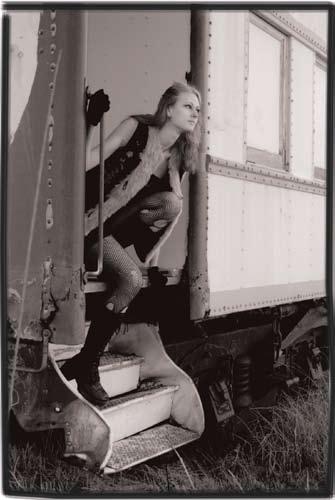
She
I miss our nights.
The full moon beaming summer nights. Talking, walking unpaved paths, past ponds and brooklets glist’ning. Fingers locking, ever longing to defy the boundaries of youth, I miss our nights.
The humid, half-crazed, summer nights. Gently pressing, moistened lips, Blushing, quivering waves of heat. Our bodies trembling, skin to skin, enveloped in oblivion.
—Chad Coleman
54 55
Jessi —Barbara
Lockwood
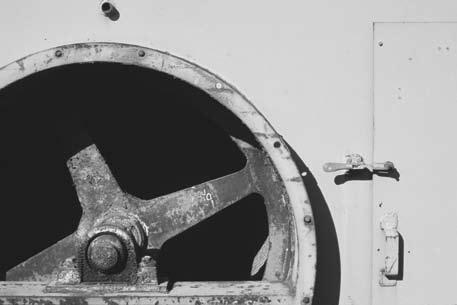
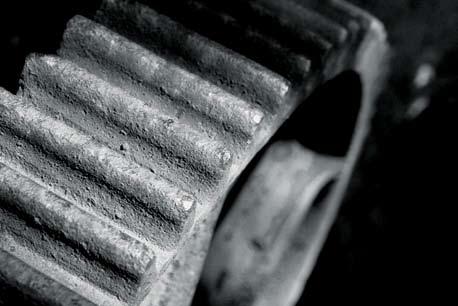
5� 5�
Wheel —Chris Swainston
Untitled —Adam Heath
War Letter
Dear Daddy, You called today. Mommy was really sad when she hung up the telephone. She just sort of fell over, like when I fell off my bike and you put that Band-Aid over my knee. But Mommy cried much harder. I went to see what was the matter. I even looked at her knee to see if she had hurt it too. She grabbed onto me and held me really close. It kind of hurt when she wouldn’t let go. She kept crying saying something about you going to war.
I’m confused Daddy, what is war? Mommy said that you will be going away to fight a bad man that has hurt other people. But why do you have to go? Why is Mommy crying so hard if this is something that is good? What happens to Daddies that go to war? I’ve seen you in your outfit, with all the pretty stars and the things you said were “medals.” You even told me that each of those were for something good you did. Do you get these “medals” from war? Can’t I just make you some stars? Mrs. Anderson said my coloring has been very nice lately. I could draw you some. Especially when you make me yummy grilled cheese sandwiches. Does that mean that you will stay? You promised you’d take the training wheels off my bike in a little while. You will still do what you promised, won’t you daddy? I know you look at those stars in the mirror and they look ever so pretty on you. Mommy even thinks

they look nice on you. But if getting one means you have to go away, I’d rather see them on Ralphy, that boy that keeps pushing me on the playground at recess.
Daddy, please don’t go. I’ll be a good girl. I’ll even make my bed every morning like you told me to. Whoever this guy is that hurt the other people, let’s write him a letter like I’m writing this one. We’ll be mean and tell him to stop doing the bad things to the people. I bet he has a little girl just like me that he makes grilled cheese sandwiches
5� 5�
Falling Stone —Adam Heath
for. And that she’ll miss him too if he goes to talk to you. Do they have cartoons over there too? Because I’m sure she watches those with her daddy too.
Mommy is calling me down to dinner now. I think we’re having casserole, bleck. Next time you should cook because cheese sandwiches are so much better. I hope you remembered to bring home the milk tonight. Mommy was really mad last time you didn’t. I love you Daddy, Olivia P.S. Let the kitty in tonight after I go to bed pretty please.
—Shelley Johnson
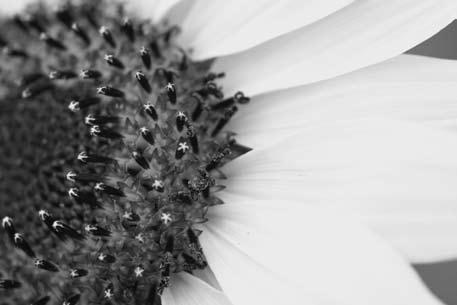
�0 �1
Sunflower
—Adam Heath
War: Not a Necessary Evil
David Powell served two tours of duty in Vietnam from 1965 to 1967, one of the most senseless and dehumanizing wars in history. Americans don’t speak much of it because we pretend it didn’t happen. He states, “The following events come to my conscious memory uninvited. I not only remember them vividly, I re-experience them with all my senses:
Froze with fright, standing up, the first time I was under fire
Watched two marines try to break open the skull of a dead Viet Cong with a large rock
Observed a marine intentionally shoot a girl four or six years of age
Watched the girl’s grandfather carry her into our line of fire, sobbing.”
Powell continues with horrific descriptions of his experiences, finding brain matter on a fence, seeing Marines laugh as Viet Cong bled to death, being abandoned, being shot, he was nearly trapped, and he was robbed. David watched a man shoot himself in the foot to get evacuated and heard the same man cry in his sleep when he was returned to the company. All this equates to vile and inhumane memories of one man’s
experiences of one war as recounted in his selection titled “Vietnam: What I Remember.”
What happens to people in war changes their whole being. They are affected by their experiences in a way that influences their sense of existence. These experiences become a part of their every day, every moment, every breath, for they have effected them in a way that every moment, every thought, every feeling is shaped by what they saw, heard, did, feared, or prayed about. War is immoral, it is ultimately ineffective, and it is indecent. War is not a necessary evil.
Is there honor in knowing that you don’t have a choice . . . to kill a child
NPR’s Morning Edition “Treatment of War Prisoners: When Does Law Apply?” posed the question of morality in war: what behavior is ethical, what crosses the line, and who makes those decisions? One caller suggested that many of the wars we have engaged in during this past century have been found to be unnecessary. The caller indicated that information we now have shows that our intentions in fighting were wrong. Vietnam is a war that our society sees as a black mark on our history, yet we continue to engage in immoral acts of violence with no solid foundation, reason or purpose. Do we seriously consider the effects of wars on our society, families, and each individual? I think we do not.
�2 �3
We engage ourselves more in the General Patton-like glamor and glory of fighting with honor, fighting for freedoms. Is there really freedom in seeing your friend’s face blown off, or sending home bodies of young fathers and sons, wives and daughters? Is there honor in knowing that you don’t have a choice whether or not to kill a child, or someone’s sister or father?
My grandfather, Cecil Hansen, served with a sense of honor in the United States Army Air Forces, stationed in Assam, India, with the Air Transport Command flying equipment and supplies, including bombs and gasoline to China. During his assignments he had many frightening experiences, flew cargo in hellish storms, had an engine catch on fire, and survived to be brought safely “home”. In his memoir A Hump Flight from Sookerating Assam, India to China, Cecil writes:
Most hump pilots [pilots who transported cargo over the “hump” between India and China] flew their whole tour of Foreign Service duty without ever having walked down the narrow streets of a Chinese city. The whole operation there was geared to put supplies over the Hump which couldn’t be done with airplanes sitting on the ground in China. As soon as my ship was uploaded and we had eaten a bite, we were on our way “home.” Only once did I stay overnight and I would have preferred not to have had the experience. It was sad to see what the people now had to live in—bombed out buildings and streets littered with debris.
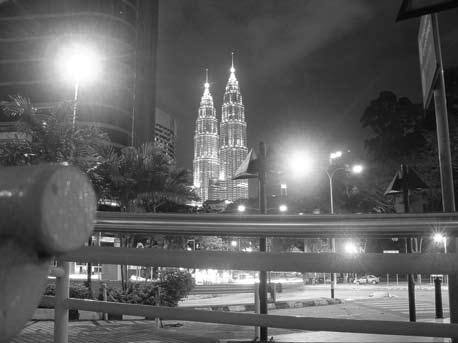
�4 �5
The Other Ones
—Kyle
Corbin Jones
Back in India, he said, “I would try to get some sleep or perhaps go to work in the Navigation Briefing Office knowing that in a day or two, I would do it all over again. In a way it was hard work and Sundays and holidays were not days off. But there was a job to be done and I was there helping to get it done so that the World could be at peace once more.” He wrote of another flight in the chapter “Storm from Hell” when the fuel gages reached the empty mark, “I continued my silent prayer, until I felt the wheels touch down on the runway. Thirty-five air craft were ‘lost’ during that storm, and as I taxied to the parking area I was grateful to be home.” For a time, India was his “home”.
Left back in the United States my grandmother, Nina, a young bride had sent her husband, her future off, never really knowing where he was. She would be following his assignments but because the military was not as supportive as they are today of their soldiers families she would wander starving for a bite to eat, lonely, searching door to door to find a place to sleep. While working in a prisoner camp in New Mexico she was burned by a war prisoner with a cigar who thought she was a Jew. She was once told that her husband’s plane was missing and She would be awakened
worried for hours just to be told that they were only seeing how she would handle the stress. She was threatened, and felt lost with her husband oversees and no money to call home, to eat, or place to sleep— only waiting. She would be awakened screaming from visions of planes crashing, thinking her life, her love, would never come “home.” Similar to my grandfather’s aircraft being out of fuel, her an evil and frightening feeling of what this kind of world was,” a world of war. We don’t stop often enough to consider the ramifications to our people of engaging in acts of war. Our wars have damaged mo re than our soldiers, made a deficit in more than our nation’s pockets.
screaming from visions of planes crashing
Charles Frazier describes how men respond in returning from the carnage of war in his book Cold Mountain. Inman’s describes the deficit of his soul as “a spiritual journey of coming to terms with what he has done, with the innocence he has lost.” He further states “War took a man out of that circle of regular life and made a season of its own not much dependent on anything else.” Fire in the Hole by Dennis Tenety remembers, “I’ve seen bodies ripped to pieces by bullets, blown into millions of scraps by bombs, and pierced by booby traps. I’ve smelled the stench of bodies burned. I’ve heard the air sound like it was boiling
“battle fatigue.”
“war neurosis”
�� ��
. . . . . .
. . .
. . .
“soldier’s heart.”
“shell shock.”
. . .
. . .
from rounds flying back and forth. I’ve lived an insanity others should never live . . .” This is the carnage, the evil of war. The American Legion of Military Veterans now describes the effects of war as Post Traumatic Stress Disorder. During the Civil War it was “soldier’s heart.” World War I renamed it “shell shock.” World War II called it “battle fatigue.” The Korean War veterans were diagnosed with “war neurosis,” and “Vietnam Syndrome” was the label for that generation. These effects certainly aren’t worth fighting for.
A.E. Housman’s poetry expresses the dishonor in not fighting, the idea of a coward’s funeral. The rhetoric used by Patton to convince soldiers to fight valiantly or be dishonored as Henry V indicated is appalling to me. Patriotic rhetoric makes war seem inviting on film; we hear the words of courage and they build us up to want to fight, to have our share of the coveted honor. If you had to watch your own child leave to fight a war that will someday be reflected upon as senseless, would you send them to “ Stand and fight and see your slain, And take the bullet in your brain?” Hell no! Do not suffer the idea of one man’s life to guard another. Use war money to build more prisons, cut off people’s arms for crimes, and hang people, but sending loved ones to die because we have allowed terror to become what it is
My grandmother said, “I lived through it, now I live with it.”
�� ��
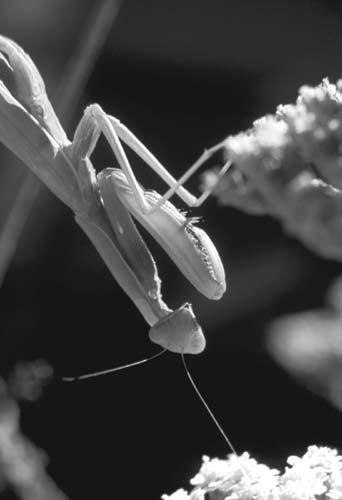
Oops!
I can feel a tickling behind my tongue, down my throat, into the depths of digestion, threatening to erupt. Sweat glands work in over-drive: streams of beads flowing from pores, drenching every article of clothing in hazy yellow. Fists clench, spastic jerks from anxiety and anticipation— a seizure of sorts. My vision gets blurry, breath quickens, heart stops. STOP As I vomit the sewer green of my stomach acids.
—Amy Snyder
�0 �1 Praying Mantis —Jeremy Allan
Untitled
be nothing in light colors and devious conceptions all tangled up in the freeness of not something (like a word spoken that then falls to the realm of unuttered syllables where they are barely are and are not something) guided in
sloppy random impulses that stem likely in the realm of unuttered as to suppose our repose is guided by omittance ergo, to try and depict our collective something as a dribble of constant unsomething
—Robbyn Curtis Mortensen
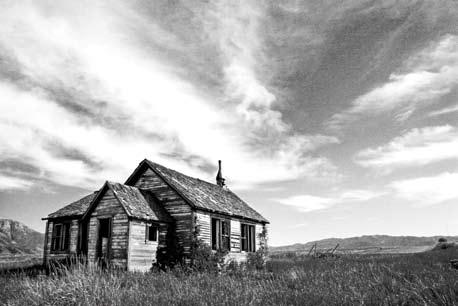
�2 �3
Memories —Randy Despain
Winter Trees
One branch divides to millions
Reaching to gray cold
Your virile life
Slumbering as death
Gripping into the soil
You stand tall
Lying by the road Motionless, fanning sky
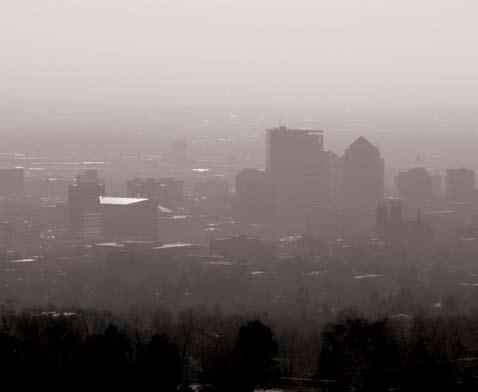
Enduring winter’s sleep
Wooden fingers reach
Flying cold gray sky
Buried in frozen ground
—Ryan Hollist

�4 �5
SLC —Dominic Mattena
Folio: Nightlife Editor
J.E. Remy Design Editor
Bradon Anderson
Folio Staff
Clint Johnson
Alex Marsh
Amy Snyder
Writing Center Liaison
Clint Gardner
Faculty Advisor
Lynn Kilpatrick
Support Provided by the Department of English and the Student Media Council at Salt Lake Community College
The Globe Media are open campus forums, and we encourage written expression of diverse points of view. Opinions expressed in Folio do not necessarily represent the views of Salt Lake Community College, the Student Media Council, or the Globe Media. Please send all submissions to folio@slcc.edu. Final publication decisions rest with the editors of Folio.
Each author/artist retains copyright individually.
Cover Art
“Night Light” by Randy Despain
Contest Winners:
“Crane” by Tawny Kai , “Torn” by Jeremy Allan, and “Wheel” by Chris Swainston were winners of the 2006 Skills USA Regional Photography Contest. For their efforts, they received publication in Folio. We wish them luck as they compete in the state competition.
Editors’ Note
With the conclusion of this edition, we pass the torch on to a new staff. We encourage them to continue presenting innovative and original ideas while maintaining the standards of expression Folio has developed through each volume. We wish them our best and look forward to seeing the evolution fresh blood will provide this creative endeavor.
The editors would also like to thank all those who have assisted in the development of Folio throughout our tenure. We’ve strived to create the most interesting and exciting editions to date, and our success is not without the assistance of many. With that in mind, it is with great pleasure that we are able to present the poetry, prose, art, and academics included within this book. We hope you enjoy reading and viewing each piece as much as we have.
—J.E. Remy & Bradon Anderson
�� ��
Missed the Deadline for Folio: Nightlife?
Folio is now accepting entries for the Fall 2006 Edition.
Authors submit poetry, drama, short stories, essays and academic works (3000 word max.) in Microsoft Word. Artists submit photography, illistrations, drawings, paintings, computer graphics, etc. in e-mail (300 dpi, CMYK format). All entries need to be sent to:
folio@slcc.edu
Please remember to include your full name, phone number, and e-mail address and title of the work with your submission. Submissions will not be accepted without this information.
Deadline for submissions is October 2, 2006.




























